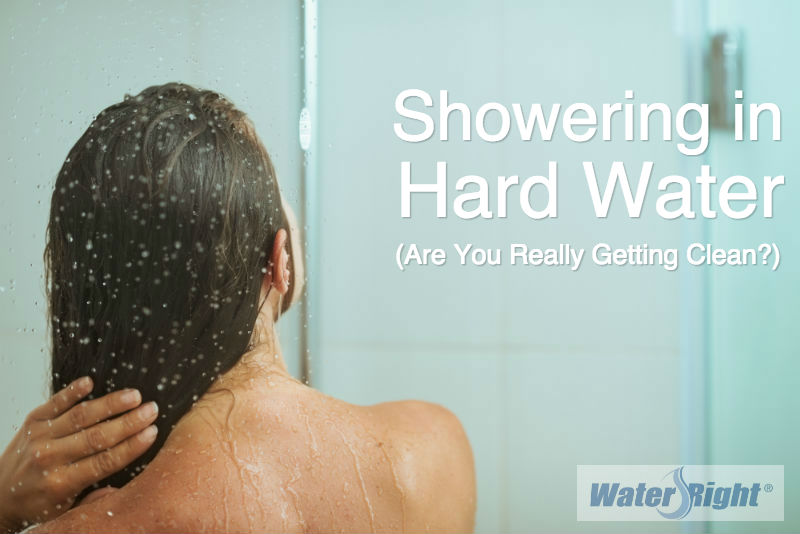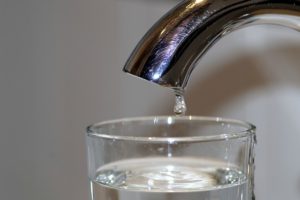 ................................................................................................................................................................
................................................................................................................................................................
 Showering in hard
water
Showering in hard
water
Are you really getting
clean?
Water-Right
For
many of us, taking a shower is priceless personal time. You’re alone with your
thoughts getting ready for the day, winding down from a workout or hectic daily
schedule.
You
are supposed to get out feeling clean and refreshed. But if you’re showering in
hard water, your showering experience could definitely be better.
In
fact, when you bathe or shower in hard water, you may not be getting as clean
as you should. Here’s why…
How
Minerals in Hard Water Keep You from Getting Clean
Dissolved
minerals like calcium and magnesium are what make the water in your home hard.
Those
minerals also create an undesirable chemical reaction with your soap, shampoo,
and body wash as well as shaving cream.
What
happens is the calcium and magnesium ions in hard water react with fatty acids
in soap to form insoluble lime soaps, which are ineffective at cleaning.
If
you were paying attention during Chemistry class, here’s the chemical equation:
2
C17H35COO−Na+ + Ca2+ → (C17H35COO)2Ca + 2 Na+
In
this chemical reaction, positively-charged calcium ions replace sodium ions in
your shampoo or soap leaving scum and lime scale deposits on your skin and in
your hair.
That’s
right. If you have hard water, the same disgusting soap scum you’re always scrubbing
in the tub is on your body too.
The
best way to know if you’re dealing with hard water problems in the shower is to
look at how well you’re lathering up.
Hard
water prevents you from getting a nice soapy lather in the shower. When you
have soft water, it’s much easier to produce a foamy lather from your soap and
shampoo.
After
installing a water softener in their home, some people notice their skin feels
slick and even slippery after bathing.
Part
of this may be due to the fact you aren’t accustomed to how truly-clean skin
feels. What you feel might simply be the real you.
But
you may also be in the habit of using too much soap. You won’t need to use as
much with soft water.
How
Hard Water Affects Your Hair
Have
you ever noticed how your hair can look and feel different when you shower in
different places?
Your
hair behaves one way after showering at the gym, turns out another way when
you’re vacationing or staying in a hotel, and looks completely different when
you wash your hair at home.
That’s
most likely because the hardness of the water varies from location to location.
A
writer for the beauty website xoVain experienced some hard water showering
issues when she vacationed in rural Wisconsin.
She
provides some great advice for showering in different types of water.
If
you have hard water at home, your hair may feel dry all the time and become
frizzy making it tangled and difficult to manage.
It
may also have a dull, lifeless appearance. That’s because those minerals and
deposits build up in your hair.
With
a water softener in your home, those hard water issues are eliminated. You will
find that your hair has a more-attractive shine when you shower in softened
water.
And
soft water will make your hair more manageable, so it’s easier for you to style
it the way you want.
Sometimes
people with finer hair complain that soft water can make their hair feel flat
or even greasy.
This
is probably because you’re using too much soap and not rinsing it out of the
hair completely. Rinsing your hair in the shower for a little longer may solve
that problem.
Of
all the hard water hair issues, the scariest has to be hair loss. Calcium build
up can form around the base of hair follicles causing hair to break off and
potentially hindering growth of new hair.
How
Hard Water Affects Your Skin
Hard
water can give you skin troubles too. Let’s start with the scalp.
The
calcium salts that build up in your scalp can cause dryness and flaking, AKA
dandruff.
You
might assume it’s the shampoo you buy causing dandruff. But hard water may be
the real culprit.
Hard
water can make the rest of your skin feel dry and itchy as well. That’s thanks
to the soapy residue left on your body, which clogs pores.
Plus,
the minerals in hard water can suck moisture right out of your skin leaving it
even more dry and irritated.
In
fact, certain studies indicate hard water may cause additional aggravation in
people with skin conditions like eczema and dermatitis.
According
to the dermatology site DermaHarmony.com:
“While hard water itself doesn’t cause dermatitis, it
can irritate the condition or even initiate a flare-up. The combination of hard
water with a co-existing dermatitis condition can lead to more frequent and
severe outbreaks.”
Even
washing clothes in hard water can be problematic to those with sensitive skin.
Hard water leaves soap residue on your laundry too, and that residue is in
contact with your skin all day long.
If
you have sensitive skin, the soft water a high-quality water softener provides
could help you avoid much of the dehydration that occurs.
As the American Cleaning Institute explains, soap’s “effectiveness
is reduced when used in hard water.”
That
means not only will you fail to get clean in the shower, it will be tougher to
keep your house clean as well.
With
hard water, you’ll end up using more soap to keep your body clean and more
product to clean your home too. Softer water could mean you save significant
money and time in the long run.
What
Can You Do?
If
you have a private well, you’re definitely dealing with hard water. But the
majority of municipal water sources have levels of hardness as well.
According
to the USGS, in the United States, 85% of the water is considered hard.
There
are certainly little tips and tricks you can use to try and improve your
showering experience. However, there’s really only one permanent solution… that’s
a water softener.
Water
softeners remove those dissolved minerals from the water in your home. They are
an investment that will make life for you and your family more convenient and
more enjoyable.
Want
to learn more about water conditioning options and what kind of water softener
would be ideal for your home? Water-Right’s product lines are among the best
residential water treatment options in the industry.
Constant innovation and no
shortcuts. Water-Right is first and foremost a company built on
integrity. Since 1963, we’ve done things the right way. Our value set has
driven the development of the finest water treatment systems, making it easy
for industry professionals to satisfy today’s demand for the highest quality
water.
Keeping water clean and safe
is an increasingly difficult challenge. That’s why we push to make good
products better, create industry-leading technology, and offer a
state-certified, independent lab specializing in water testing. It’s about
making life better as well as providing “The Right Water for Life.”
:max_bytes(150000):strip_icc():format(webp)/GettyImages-476804983-58cb0a905f9b581d72a96c97.jpg)
:max_bytes(150000):strip_icc():format(webp)/GettyImages-476804983-58cb0a905f9b581d72a96c97.jpg)

:max_bytes(150000):strip_icc():format(webp)/GettyImages-476804983-58cb0a905f9b581d72a96c97.jpg)
:max_bytes(150000):strip_icc():format(webp)/GettyImages-476804983-58cb0a905f9b581d72a96c97.jpg)









 Thirsty
for the Water of Life?
Thirsty
for the Water of Life?
